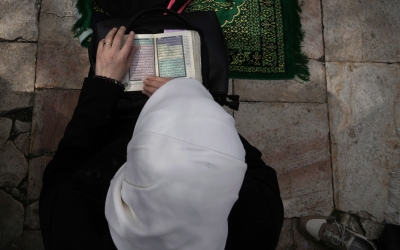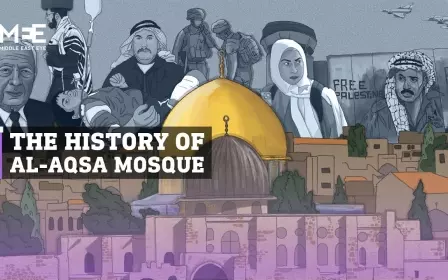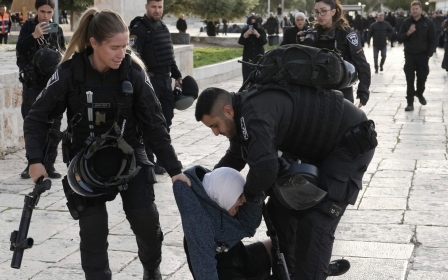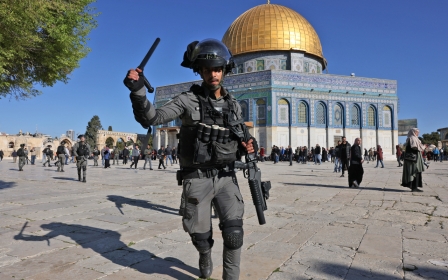Israeli MP's plan to divide Al-Aqsa is dangerous and must be rejected

Last month, news emerged that Israeli Knesset member Amit Halevi was putting forward a plan to divide Al-Aqsa Mosque complex between Muslims and Jews. Under his proposal, roughly two-thirds of the area, including the Dome of the Rock, would be for Jews, while the remaining portion, including Al-Aqsa Mosque, would be for Muslims.
This ratio is similar to how the Ibrahimi Mosque in Hebron was divided after the horrific massacre by settler Baruch Goldstein in 1994, which killed 29 Palestinian worshippers. Dozens more were killed or injured in ensuing protests.
Rather than removing the colonisers from Hebron altogether, the Israeli military confiscated a majority of the mosque. Muslims are also prevented from entering the Ibrahimi Mosque during Jewish holidays.
Restrictions at Al-Aqsa Mosque are already in place, with Muslims entering for worship registered electronically by Israeli police. Although the historical status quo stipulates that only Muslims can pray at Al-Aqsa Mosque, Jewish settlers, accompanied by Israeli security forces, routinely storm the complex. Violations are documented by the Jordanian religious authorities who manage the site.
Halevi’s plan reflects growing right-wing fanaticism in Israel, alongside personal political ambitions within the Likud Party, with Prime Minister Benjamin Netanyahu’s political career jeopardised by legal battles.
New MEE newsletter: Jerusalem Dispatch
Sign up to get the latest insights and analysis on Israel-Palestine, alongside Turkey Unpacked and other MEE newsletters
Extremists within the government, including Finance Minister Bezalel Smotrich and National Security Minister Itamar Ben Gvir - influenced by Rabbi Meir Kahane, the late leader of the racist Kach party - do not shy away from supporting settler terrorism and violations of international law, with total disregard for global treaties.
Halevi’s plan, which suggests that the division of Al-Aqsa complex should be enshrined in law, aligns with the wishes of many current and former Israeli politicians, some of whom have expressed a desire to destroy the Dome of the Rock and replace it with a Third Temple. Uri Ariel, the former agriculture minister, has publicly professed such wishes.
Settler influence
Observers have pointed out that the “Temple Mount” settler movement is no longer a fringe group, exerting great influence on all three branches of government in Israel. Halevi’s proposal would abolish the historical status quo at Al-Aqsa, which the right-wing government and extremist ministers have already been working hard to undermine.
Halevi also suggests removing the kingdom of Jordan’s authority over Al-Aqsa, perhaps forgetting that Israel didn’t confer anything on Jordan; rather, the 1994 peace treaty between the two countries recognised Jordan’s existing role.
Jordan's custodianship over the Muslim and Christian holy places in Jerusalem is entrenched in international treaties and recognised by the world at large
Jordan’s custodianship over the Muslim and Christian holy places in Jerusalem is entrenched in international treaties and recognised by the world at large. Most importantly, it reflects a century of the Hashemites’ family history, which is inseparable from the history of holy places in Jerusalem.
In 2013, a treaty between Jordan and the Palestinians noted that “the continuity of Hashemite King of Jordan’s custodianship of the holy sites since 1924 makes His Majesty more able to maintain the holy sites and to preserve [Al-Aqsa Mosque]”.
Halevi has expressed his desire to “exercise [Jewish] ownership of the Temple Mount through an information war that will eradicate the ‘Muslim Al-Aqsa plot’”. This suggests that he will resort to a campaign of misinformation about the definition, history and importance of Al-Aqsa Mosque complex, which is a typical Israeli hasbara approach.
Halevi also rejects the name Al-Aqsa Mosque complex, saying that only a “small part of it is Al-Aqsa Mosque, at the southern end” of the 14.4-hectare site. He adds: “The Muslims expanded the mosque beyond recognition starting in the year 2000, when they annexed Solomon’s stables, excavated and removed huge amounts of dirt with precious archaeological findings, and built another large mosque in the space.”
Historical realities
His accounting of past events is not accurate. More than five centuries ago, historian Mujir al-Din chronicled the history of Jerusalem and Hebron, noting that he measured Al-Aqsa Mosque twice “from the northern wall to the southern wall, and from the eastern wall near Bab Al-Rahma to the western wall near the Tankaziyyah school”, which was confiscated for the use of Israeli occupation forces. Thus, Al-Aqsa Mosque complex was historically understood to cover all 144 dunums, including its walls and subterranean halls.
Halevi’s plan to divide the site would permit Muslims to continue praying at Al-Aqsa Mosque, referring only to the southernmost Qibli Mosque. This is not a generous gesture.
Many archaeologists believe that the southern part of the complex was added by the Roman emperor Hadrian. Halevi forgot to mention that there were no archaeologists with a definitive idea about the whereabouts of the last Jewish temple, with various theories making the rounds.
Some experts have placed the temple near the Gihon Spring, south of Jerusalem’s Old City, in what was formerly the city of Jebus. This was the position of author Ernest L Martin in The Temples that Jerusalem Forgot, based on the work of Jewish Roman historian Josephus.
Halevi rightly understands Jordan’s custodianship at Al-Aqsa Mosque as the reason it is not considered to be under Israeli sovereignty. But despite international agreements, he considers this a “historical sin” and wants to end the status quo, regardless of the associated security risks. His plan is deeply unwise and would have severe repercussions across the region.
The views expressed in this article belong to the author and do not necessarily reflect the editorial policy of Middle East Eye.
Middle East Eye delivers independent and unrivalled coverage and analysis of the Middle East, North Africa and beyond. To learn more about republishing this content and the associated fees, please fill out this form. More about MEE can be found here.






